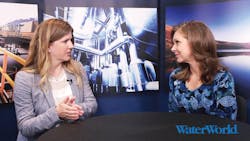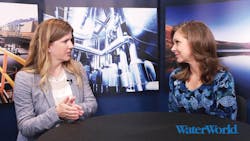Wastewater’s role in reducing greenhouse gas emissions
Managing greenhouse gas emissions is a critical component of mitigating the effects of climate change, and methane, which is produced during the wastewater treatment process, has high global warming potential. As such, regulatory attention in California has turned toward tracking, as well as reducing, methane emissions — and wastewater treatment is playing an important role.
“We do generate methane (as far as biogas) at a wastewater treatment plant but we generally capture it and make use of it,” said Sarah Deslauriers, a climate change lead with Carollo Engineers. But there is another significant source of methane coming from the biodegradation of food waste at landfills, she noted. Through codigestion, however, food waste could be mixed with sewage sludge and turned into biogas that could be captured and used. This would reduce the methane emissions at landfills, she explained, and augment biogas production. It would also help meet climate change targets in the state.
Senate Bill 1383, adopted in 2016, focuses on short-lived climate-pollutant reduction — in this context, methane. Since then, Deslauriers said, a subsequent regulation has been developed to come up with an implementation plan to meet the mandates: 40 percent below 2013 levels by 2030, with 75 percent diversion of food waste by 2025. “So it’s a very short deadline,” she noted.
Carollo’s Sarah Deslauriers talks with Angela Godwin on The Drop.
Wastewater treatment plants are uniquely positioned to be a big part of the solution. “We’re all very excited about the opportunity,” she said, “but it is a big challenge for the state and the wastewater agencies.”
Indeed, it’s a fascinating concept, but one that would presumably have major infrastructure implications. “Yes,” agreed Deslauriers, “there is infrastructure that needs to be put in place to preprocess that food waste and bring it into a digestible form (which is a slurry) that we can then mix with sewage sludge.”
This could happen at the landfill and then be transported over to a wastewater treatment plant, she suggested, or it could happen at the wastewater treatment plant.
“This is really where a partnership needs to be made,” she suggested. According to Deslauriers, these conversations are happening right now. “We are having discussions in California between the wastewater sector and waste management folks so we can figure out how we can work together to make [it] happen.”
In addition, the California State Water Resources Control Board has a project underway, she noted, researching the codigestion capacity at wastewater treatment plants across the state in order to assess the feasibility of food waste-to-energy initiatives as well as any barriers and opportunities.
Amongst the ongoing research and discussions, examples do exist, Deslauriers said. “There are case studies that we are looking at from the small (Central Marin Sanitation Agency) to the large (East Bay Municipal Utility District and L.A. County Sanitation District),” she said. Their experiences will offer valuable lessons for others to learn from and emulate. WW
Editor’s Note: Watch the full interview with Sarah Deslauriers on The Drop at WaterWorld>WaterWorldTV.
About the Author

Angela Godwin
Editorial Director
Angela Godwin is the previous editorial director for Endeavor Business Media's Process/Water Group.

